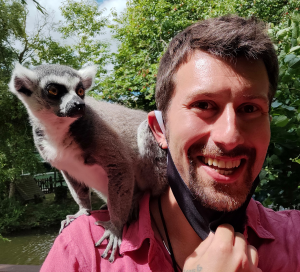Garcia-Pelegrin, Elias

Assistant Professor
Ph.D. (Cambridge), M.Sc. (UCL), B.A. (Hons.) (Essex)
Once regarded as uniquely human, the capacity to comprehend others' emotions, retain and access memories, plan for the future, and employ intricate tools has become a subject of fascination in the study of non-human animal cognition. Advancements in research have revealed that these complex cognitive abilities are not exclusive to humans, but can also be found in other primates, cetaceans, birds, and various other taxa. Nonetheless, a multitude of profound questions remains, concerning the nature and development of intelligence in both humans and non-human creatures.
What defines complex cognition? How did it evolve throughout the ages? Why do certain animals exhibit remarkable cognitive prowess while others do not? My research delves into the evolution of cognitive complexity, exploring whether it arises from shared ancestry or convergent evolution. By investigating a diverse array of species, including hornbills, crows, parrots, dolphins, and non-human primates, I seek to gain insight into their perception of the world and whether their experiences bear any semblance to our own.
| TEL: | (65) 6516 67653 |
|---|---|
| EMAIL: | egarpel@nus.edu.sg |
| ROOM: | AS4-03-30 |
| WEBPAGE: | Garcia-Pelegrin, Elias |
Research Interests:
- Animal Behaviour and Cognition
- Cognitive Evolution
- Zoo and Aquarium Research
Recent/Representative Publications:
Davies, J.R., Garcia-Pelegrin, E. (2023). Bottlenose dolphins are sensitive to human attentional features, including eye functionality. Scientific Reports, 13, 12565.
Garcia-Pelegrin, E., Miller, R., Wilkins, C., & Clayton, N. S. (2023). Manual action expectation and biomechanical ability in three species of New World monkey. Current Biology, 33(9), 1803-1808.
Garcia‐Pelegrin, E., Clark, F., & Miller, R. (2022). Increasing animal cognition research in zoos. Zoo Biology, 41(4), 281-291.

